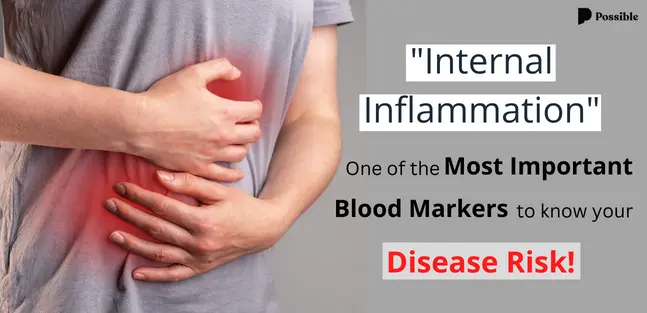You might be aware of inflammation. Inflammation means a cut or a swollen tissue that is painful. It is the body’s response to removing damaged cells or irritants before the healing process can begin.
But do you know there is something called internal inflammation which is invisible?
It is neither painful nor visible, but it’s extremely deadly. It is a fire that is kept hidden by the body‘s immune system as it combats food allergens, toxins, stress and bad food.
Even though this inflammation is harmful, we sadly don’t have any antiseptic that can cure it. Internal inflammation occurs due to refined carbs, sugar, trans fats and many inflammatory omega-6 fats, artificial sweeteners, gluten, dairy, chronic infection, stress, processed plant oils, hidden food allergies and sensitivities, etc. It can cause multiple diseases including cardiovascular disease, arthritis, depression, Alzheimer’s disease and cancer!
How Do We Measure Internal Inflammation?
With the help of a very simple parameter called HS-CRP (High sensitivity C-reactive protein). It is produced by the body when blood-vessel walls are inflamed. High CRP is an indicator of inflammation, the natural response of the body to injuries, infections and threats.
The higher your levels of HS-CRP, the higher your levels of inflammation tend to be. The standard range for HS-CRP is 0-2.9, but the optimal range is 0-1.7. If you have higher levels of HS-CRP, then you need to make lifestyle modifications to bring it down.
What Should Be My Level?
The American Heart Association and U.S. Centres for Disease Control and Prevention define cardiovascular risk groups for HS-CRP levels as follows.
- Low risk: < 1.0 mg/L;
- Average risk: 1.0-3.0 mg/L;
- High risk: > 3.0 mg/L. [1]
People with high hs-CRP have a 1.5 to 4X higher risk of heart attack than subjects with low hs-CRP.
What Causes Internal Inflammation?
There can be multiple causes. Some of the prominent ones are:
- Bacterial infections like tuberculosis, pneumonia and sepsis can increase CRP.
- Fungal and Viral infections. You may not be even aware of many of these infections. Only through blood tests, you can find out whether you have chronic infections.
- Autoimmune conditions such as rheumatoid arthritis, lupus, and inflammatory bowel diseases.
- Brain inflammation could lead to depression and other mental health conditions.
- Bone infections such as osteomyelitis.
- Chronic Fatigue.
- Heart Disease.
- High Blood pressure.
- Cancer.
- Metabolic conditions such as Diabetes, PCOS, and Obesity.
- Food allergies damage the gut lining.
- Lack of activity and lack of sleep.
- Smoking and excessive alcohol use.
What Should I Do To Lower Internal Inflammation?
There is no standard answer to this simple question. As you can see there can be multiple factors for high inflammation. Hence the first step is to identify the root cause or causes. A detailed blood test is the best way to do a diagnosis.
If you have an acute infection or chronic infection, your CBC report will show that. Based on that, a proper solution needs to be devised.
Some broad principles to lower internal inflammation are:
- Decrease body fat if you are overweight. When fat cells in the body are stuffed with excess fat, the surrounding tissue becomes inflamed. So, losing excess weight is the most important point for HS-CRP.
- Identify if you have any infections, especially chronic infections and work on that.
- Take anti-inflammatory foods like lemon, tomatoes, broccoli, mushrooms, green leafy vegetables, seeds and nuts, green tea, berries, dark chocolate, etc.
- Avoid inflammatory foods such as processed meats, sugar, refined grains, cola, alcohol, and fried foods.
- Avoid or minimise consumption of dairy and gluten products as both commonly cause inflammation.
- Take spices and herbs which are anti-inflammatory: garlic, ginger, turmeric, cardamom, cinnamon and rosemary.
- You can try the following ayurvedic herbs as well: ashwagandha, Boswellia, Triphala, Brahmi and curcumin.
- Taking supplements is also helpful: omega-3 fish oil (it’s amongst the most anti-inflammatory compounds on the planet), resveratrol, vitamin D and bromelain.
This is a much more important marker than cholesterol in predicting heart disease. So, get yourself checked today.
